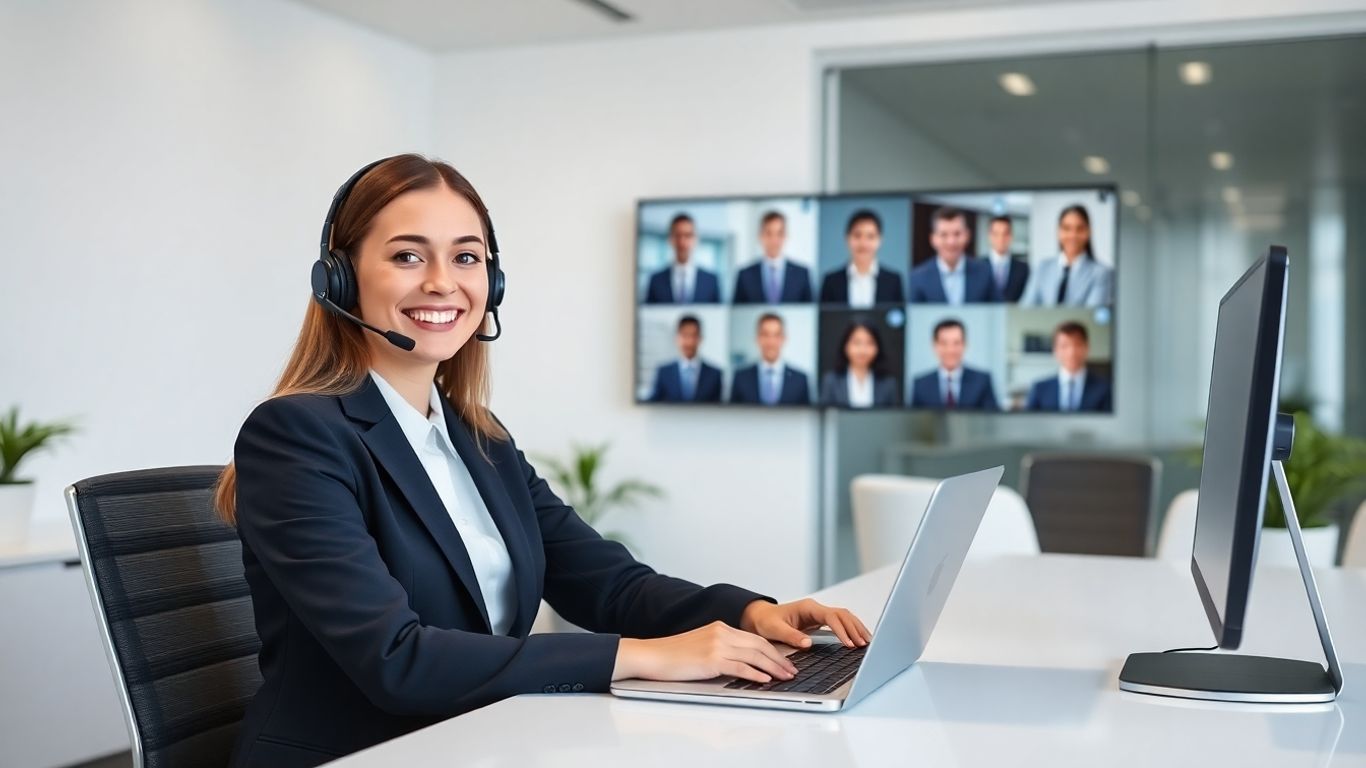Law firms are busier than ever, and clients expect fast, clear communication—day or night. But let’s be honest: nobody has time to answer every call, schedule appointments, and keep everyone updated 24/7. That’s where a virtual receptionist law firm solution comes in. This isn’t just some fancy tech trend; it’s a practical way to make sure your clients always feel heard and supported, while you get to focus on actual legal work. If you’ve ever missed a call and wondered if it cost you a client, you’ll want to know how this technology is changing the game in 2025.

Missing a client’s call can seem like no big deal—until you add it up. For law firms, every missed call is a potential client lost, an update delayed, or a relationship weakened. Clients who can’t get through often end up calling the next firm on their search list. That snowballs into lost cases, poor reviews, and even negative word of mouth. Here are a few things your firm might deal with if calls go unanswered:
In a world where quick responses matter, missed calls can quietly sabotage your firm’s reputation and pipeline.
Clients don’t always operate on your 9-to-5 schedule. Questions and urgent issues pop up at night, early in the morning, and on weekends. That’s where a virtual receptionist steps in. By being always-on—before, during, and after business hours—your firm meets client needs around the clock. This isn’t just about picking up the phone; it’s being available when clients need you, no matter what. Some AI receptionist solutions now handle calls, answer questions, and book appointments 24/7, so no call or opportunity is left behind.
Here’s how all-hours support helps:
It's not enough to just answer every call—you need to make sure they get to the right place without delay. Virtual receptionists can:
Firms using a virtual receptionist often find that responsiveness improves, clients feel heard, and opportunities aren’t lost to competitors.
These days, clients expect fast and ongoing communication from their law firm, no matter what time it is. If you’re still only answering phone calls between 9 and 5, your firm may be losing business to competitors who never seem to sleep. This is where a virtual receptionist makes all the difference: round-the-clock service is not just a perk—it’s the baseline.
Legal issues can be stressful and clients often face emergencies outside typical office hours. When someone’s calling at 11pm about a bail hearing or a protective order, they’re not interested in voicemail. A virtual receptionist solution can:
Fast, real-human responses after-hours give worried clients peace of mind and signal that your firm really cares about their needs—no matter when they arise.
Your law firm’s clients may live and work across different time zones or reach out during federal holidays. Missing these calls can lead to frustration or even lost opportunities. A virtual receptionist can:
This flexibility means you’re open for business when others aren’t.
There’s not much worse for a stressed-out client than hearing a busy signal or being sent to voicemail—especially if it happens more than once. With a virtual receptionist service:
Here are three ways a virtual receptionist keeps every line open:
Reliable and always-ready service solves one of the most frustrating pain points for clients: uncertainty. When clients know your law firm is always reachable, even at off hours, it builds real trust and sets you apart.
Modern law clients want more than just fast answers—they want to feel recognized, valued, and confident that your firm understands their needs. The right virtual receptionist solution doesn't just pick up the phone; it actively shapes each caller’s experience around your law firm’s brand and client expectations. Here’s how the latest tools in 2025 are changing the game for law firm personalization.
Every law firm has its own voice—some are formal, others more approachable. Virtual receptionist platforms in 2025 offer detailed script customization, letting you shape how your receptionist greets callers and handles tricky topics. For example:
This flexibility lets your brand consistently shine through, even when the caller never speaks with a lawyer directly.
Check out these 24/7 AI call services offering advanced script controls for law firms.
Clients expect clear, professional updates—no matter which team member or receptionist answers. Advanced virtual receptionist technology centralizes training and updates so that every caller receives:
This approach builds trust—clients know they won’t get mixed messages, whether they call at 9 a.m. or 9 p.m.
The difference between a firm with a solid virtual receptionist and one without? Clients never feel like they're passed from person to person. It's one consistent, confident voice.
Personalization means not treating every caller the same. Virtual receptionists can distinguish:
The system can greet returning clients by name, reference recent communications, or tailor prompts—and route new leads straight to the right intake process. This saves time, reduces frustration, and shows attention to detail from the first call.
Here’s a quick table showing the difference in service flow:
Remember, even small touches—like celebrating client milestones—can set your firm apart, as mentioned in this note on client recognition.
In 2025, the top virtual receptionist tools give you the ability to shape every interaction. That’s no longer a luxury, but a baseline for legal client satisfaction.

Modern law firms live and die by their calendars. When you’re juggling court dates, client consultations, and last-second schedule changes, the last thing you want is a double-booked meeting or endless back-and-forth messages just to settle on a time. Virtual receptionist solutions take all that pain away by handling scheduling directly and without error.
With today’s virtual receptionists, appointment requests are handled instantly. No more waiting for an available staff member to confirm, and no more missed opportunities because someone called after hours. Incoming calls or online requests are synced straight to your calendar and your legal software—often with real-time integration with platforms like Clio or Lawmatics.
Here’s how a direct booking process typically looks:
Want to see this in action? Even services like Frontdesk’s AI receptionist can integrate with your calendar and book spots for clients, whether it’s noon or midnight.
Double bookings are more than annoying—they can ruin trust with clients. Virtual receptionists remove the risk by:
Automated scheduling is just the beginning. Many virtual receptionist platforms collect all the info you need from new clients as part of the booking process. So, instead of chasing down missing forms or leaving voicemails, you get a complete client profile every time an appointment is set.
Often, these systems will:
A smooth calendar is more than a convenience—it’s a game-changer for client experience, ensuring you’re prepared for every meeting and never scrambling for details at the last minute.
By automating booking, syncing every update, and streamlining intake, your team can focus on what matters: helping your clients, not wrangling your schedule. And customers notice the difference—few things feel more professional than instant, error-free scheduling.
If you want a closer look at appointment streamlining and how it helps, see practical tips straight from specialists in AI-powered appointment management.
Connecting your virtual receptionist directly with your law firm's practice management software isn't just a nice feature—it's often the difference between chaos and calm. Integration means information flows freely between tools, calls turn into appointments without manual entry, and no important client note slips through the cracks. Let's unpack how this works in a modern law office.
The best virtual receptionists work with popular legal management platforms out of the box. When new client details come in over the phone, those details land straight into your case files—no copying, pasting, or “Monday morning data entry headaches.”
Having your receptionist and case manager work together (even virtually) means you spend less time double-checking info and more time helping clients.
For more on why these tools are foundational for small firm efficiency, see practice management software advice.
Tired of informing clients one-by-one when there’s a court date change, or sending repeated reminders to your team? Integrated virtual receptionists send out:
This automation shrinks turnaround times and stops balls from being dropped, especially during hectic weeks.
The magic happens when information flows both ways:
When your receptionist integrates tightly with your legal tools, it stops being "just" a call handler. Instead, it becomes a vital piece of your workflow, helping everyone in your practice stay organized and responsive. If your firm is considering a move, make sure it plugs in with what you already use. For a broader perspective on workflow automation, check out how modern practices are investing in upgrades including AI-powered phone receptionists.
Modern legal practices, especially in 2025, are hustling to trim unnecessary expenses and run tight ships. If you're managing a law firm, you probably already know the struggle: balancing the budget between top-tier service and the real cost of staffing. Here’s where a virtual receptionist law firm solution changes the game. Let's break it down:
Hiring full-time front desk staff means paying salary, benefits, sick days, and then dealing with coverage for vacations. In contrast, a virtual receptionist—especially an AI-driven one—delivers many of the same functions at a fraction of the cost. You pay only for what you use, with no surprises from payroll taxes or recruitment headaches. Here’s a look at annual cost comparisons:
Virtual receptionist software lets you control your budget even more—with usage-based models and the ability to set max minutes, as seen in cutting-edge AI front desk systems. This flexibility gives you predictable billing and lets your firm:
This kind of control helps smaller firms compete with larger ones, all without overextending financially.
Every minute lawyers spend answering the phone or responding to routine inquiries is time lost on billable work. With a smart virtual receptionist system, non-billable administrative distractions drop dramatically. Instead, lawyers focus on practicing law—handling cases, strategizing, preparing for trial. Here are some everyday ways a virtual receptionist boosts productivity:
Law firms that rethink receptionist work can redirect valuable time and resources, leading to improved profitability and a much more responsive client experience.
Embracing these tools isn’t just about slashing costs—it's about making your firm smarter and more agile in a competitive market.

It’s not just clients who call your law firm. Every day, you interact with a whole range of people—clients looking for updates, opposing counsel confirming deadlines, vendors sending invoices, and courts getting in touch with procedural updates. Handling these different calls smoothly used to mean juggling sticky notes and endless phone tag.
A virtual receptionist law firm solution brings order to the chaos by answering, triaging, and forwarding calls instantly, no matter who’s on the line. Every call gets the attention it deserves, and nothing slips through the cracks.
Table: Types of Stakeholder Calls Managed
Law firms deal with more than just their clients every day. A flexible virtual receptionist keeps everyone connected and informed, which means your attorneys and staff spend less time playing phone tag and more time getting real work done.
A virtual receptionist uses advanced screening and smart workflows to sort potential clients before they ever reach your desk. This turns missed connections into properly qualified leads and lets you spend more time on legal work, not chasing the wrong cases.
Virtual receptionists now use intelligent intake forms and client questionnaires, either by phone or text, to determine:
Typical questions a virtual receptionist asks might include:
If a caller doesn’t fit your firm’s requirements, the receptionist politely bows out—saving you both wasted time.
Having a smart gatekeeper means you won’t be stuck in consultations just to say “no.” It also builds trust with prospects, because they get answers faster.
No law firm can survive on delayed call-backs. Today’s virtual receptionists answer every inquiry right away, even at 10 PM. If someone says “my court date is next week,” your system has their details captured—and can schedule them for a consult immediately if they fit your intake criteria.
Here’s what modern virtual receptionists offer:
Virtual receptionists don’t treat every caller the same. With new tech, you can flag priority leads using preset rules (for example: high-value case type, urgent timeline, or strong referral source). The system pushes these leads to your team instantly—no waiting in a pile of voicemail messages.
Key benefits:
The bottom line: smart lead capture and screening is now automatic, accurate, and always working, even when your firm is off the clock.
When it comes to running a law firm in 2025, knowing exactly how calls and client communications are handled isn’t a luxury anymore—it’s the baseline. Tracking performance and using analytics help law firms see what’s working, what’s stalling, and where to make quick changes. A modern virtual receptionist law firm solution offers built-in tools for this level of insight.
Every missed or mishandled call can cost your firm future business. That’s why reviewing call logs and tracking appointment conversion rates is so important. Here’s how most platforms deliver clarity:
Reviewing these logs lets firm managers find bottlenecks and spot opportunities to improve.
A handful of missed calls might not look like much, but over time, fixing just a few key gaps can drive consistent growth.
Manual note-taking is finally on its way out. AI-powered transcription automatically converts call audio into searchable text, and even generates summaries or highlights next steps:
With advanced analytics, law firms can measure everything from response time to how quickly the team follows up.
You can’t improve if you don’t know what clients think. Virtual receptionist platforms often help gather direct feedback seamlessly:
Continuous improvement relies most on regularly closing the loop—taking real comments and results, and actually making changes. It turns out, the firms that stay on top of their numbers and listen to feedback tend to run the smoothest operations and make clients happier in the long run.
When it comes to law firms, keeping client information safe isn’t optional—it’s at the core of your entire business. A virtual receptionist designed for legal practices has to treat privacy and compliance as top priorities, or you could run into trouble faster than you’d think. Here’s a look at how a virtual receptionist solution tackles the security and confidentiality needs of modern law firms.
Virtual receptionists that work with legal firms often use specialized technology to keep your data out of the wrong hands. Instead of just relying on password protection, these services routinely use multiple strategies:
Let’s be real: hackers target law firms because of the valuable info you handle. So, not only does this technology stop casual snoopers, but it also holds up against more serious threats.
Receptionist software doesn’t just lock the door; it gives you control over who even gets a key. Most advanced solutions include role-based access controls, which means:
This way, you can keep tight reins on vital information, even as your team grows or changes.
Worried that putting admin and intake work outside the firm will threaten attorney-client privilege? Virtual receptionist services built for law firms address this specifically by:
Most law firms fear that outsourcing means losing control over privacy, but with a vetted virtual receptionist service, you often have more control and evidence of compliance than with an in-house operation.
**Bottom line: a legal-focused virtual receptionist should strengthen, not weaken, the protections you offer your clients. Pick a platform with the right privacy tools, audit trails, and user controls to keep confidential info locked down."

A great virtual receptionist will only be as good as the onboarding and training they receive. Law firms should lay a solid groundwork for collaboration and clear communication right from the start.
Onboarding isn’t something you just check off and forget about; ongoing feedback and script reviews help keep client calls smooth and error-free.
If you’re unsure how to frame your protocols, check out how other professionals manage call flow and staff training for smoother operations.
For law firms that want to adapt quickly as needs change, brands using white-labeled, customizable AI solutions benefit from easy provider retraining and flexibility.
A virtual receptionist can't replace every in-person duty at your law office. Some tasks still need someone physically present, like greeting clients at the door, handling incoming mail, or managing office materials. Law firms that rely on these everyday in-house jobs will have to keep a real receptionist onsite or delegate these chores to other staff members.
Law firms often find themselves needing a blend: AI or remote staff for remote call handling and someone at the front desk for those face-to-face moments. Going 100% virtual isn’t always realistic, especially for firms with lots of office visitors.
Even if you pick a legal-focused virtual receptionist provider, you’ll need to train them on your particular habits and routines. This includes:
You’ll probably invest some time upfront building FAQs, call flows, and guides. While most platforms make setup simple (check how easy it is with AI Front Desk’s tools), this training period can’t be skipped if you want every call handled just right.
Automating your phones comes with upsides—speed, no missed calls, lower costs. But striking the right balance takes work. Too much automation can make calls feel impersonal or leave clients frustrated if their needs are unique and the receptionist doesn’t know how to respond. Real human staff can pick up on urgency, tone, and little details that AI still sometimes misses.
Considerations for law firms:
When setting up your AI phone answering system, ask yourself how much you want automated and who will step in for the jobs a platform just can't do yet. If you get this mix right, you’ll gain the benefits without risking your reputation for personal care.
While a virtual receptionist can make things easier for your law firm, there are some things to keep in mind. Not every situation is a good fit, and technology sometimes has limits. It's smart to do some research before making a decision. Want to learn more and see if this service is right for you? Visit our website for more information and try it out today!
So, here’s the bottom line—virtual receptionists aren’t just a tech trend. They’re changing the way law firms handle client calls, appointments, and even those routine questions that eat up your day. With a virtual receptionist, you don’t have to worry about missed calls or clients feeling ignored. Your team gets more time to focus on actual legal work, and your clients get the quick, friendly responses they expect. Plus, with features like 24/7 availability, easy setup, and integration with your favorite tools, it’s not just about saving money—it’s about making your whole operation run smoother. If you’re looking to boost client satisfaction and free up your staff, it might be time to give a virtual receptionist a try. The future of client service in law is already here, and it’s a lot simpler than you might think.
A virtual receptionist is a person or AI who answers your law firm's calls, schedules appointments, and gives information to clients—all from a remote location. They handle the same jobs as an in-house receptionist but work online or over the phone.
Virtual receptionists make sure every call is answered, even after business hours. This means your clients never get a busy signal or go straight to voicemail, so you never miss a chance to help someone or get a new client.
Yes! Many virtual receptionist services are available 24/7, including weekends and holidays. This way, clients can reach your firm anytime they need help, no matter what time it is.
Virtual receptionists can book appointments right into your calendar or legal software. This keeps your schedule organized, avoids double bookings, and helps clients find times that work for them without lots of back-and-forth.
Most virtual receptionist services are easy to set up. You just tell them about your firm, share your call instructions, and connect your calendar or practice management tools. Many services can get you started in just a few minutes.
Not usually. Virtual receptionists use scripts and training to match your firm's style. Whether it's a real person or AI, they speak politely and professionally, so clients feel like they're talking to someone who works right at your firm.
Virtual receptionist services use secure systems and follow rules to protect private client information. They use things like encrypted calls, password protection, and special training to keep everything confidential.
Virtual receptionists work remotely, so they can't greet people in person or handle physical mail. If your firm needs help with these in-office tasks, you might still need some on-site staff for those jobs.
Start your free trial for My AI Front Desk today, it takes minutes to setup!








